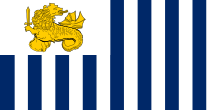Bureau of Customs
|
Bureau of Customs Kawanihan ng Adwana |
|
|---|---|
| Common name | Bureau of Customs |
| Abbreviation | BoC, BOC |

Emblem of the Bureau of Customs
|
|

Ensign of the Bureau of Customs
|
|
| Agency overview | |
| Formed | February 5, 1902 |
| Legal personality | Governmental: Government agency |
| Jurisdictional structure | |
| National agency | Philippines |
| General nature |
|
| Operational structure | |
| Headquarters | POM Building, Port Area, Manila, Philippines |
| Agency executive | Nicanor Faeldon, Commissioner |
| Parent agency | Department of Finance |
| Website | |
| www.customs.gov.ph | |
The Bureau of Customs (abbreviated BoC or BOC; Filipino: Kawanihan ng Adwana) is a Philippine government agency under the Department of Finance. It is responsible for regulating and facilitating trade, assessment and collecting import duties and taxes, combating illegal trade and other forms of customs fraud, and devising and managing customs management systems for trade facilitation.
The Bureau of Customs was established on February 5, 1902 by the Insular Government, while the Philippines was a possession of the United States.
Historical records show that the customs service in the Philippines started many centuries back long before it was discovered by the eastern and western expeditionaries. The Philippines had already a flourishing trade with countries of Southeast Asia, but since money at that time was not yet the medium of exchange, people then resorted to the barter system of commodities. The rulers of the barangays were known as the datu or rajahs collected tributes from the people before they were allowed to engage in their trade. The practice of collecting tributes became part of their culture and was then observed and followed as the Customs Law of the Land.
After Spain had taken full control of almost all the trades of the country, it passed three important statutes:
When the Americans came to the Philippines, the Military Government continued to enforce the Spanish Tariff Code of 1891, which remained in effect until the Philippine Commission enacted the Tariff Revision Law of 1901.
On October 24, 1900, the Philippine Commission passed Act No. 33 abolishing and changing the position of Captain of the Port to Collector of Customs in all ports of entry except the Port of Manila. The designation of the Captain of the Port in the Port of Manila was retained.
When the Civil Government was established in the Philippines, the most important laws passed by the Philippine Commission were the following:
...
Wikipedia
